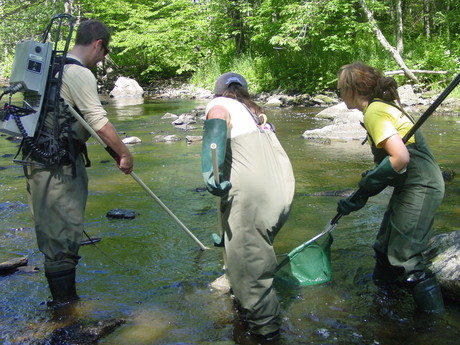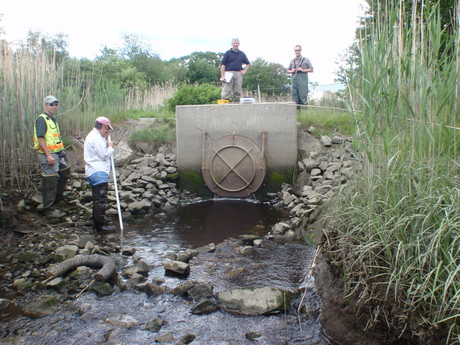The Wrack
The Wrack is the Wells Reserve blog, our collective logbook on the web.
The Wrack is the Wells Reserve blog, our collective logbook on the web.
Just one of many projects underway in the research department at the Wells Reserve this summer is the environmental monitoring of the Mousam and Kennebunk Rivers in support of an ongoing initiative, the Mousam & Kennebunk Rivers Alliance (MKRA).
The mission of the MKRA, first established in 2008, is to restore the health of the Mousam and Kennebunk Rivers by restoring habitat, water quality, and fish populations. The MKRA, a partnership between the Wells Reserve, Maine Rivers, the Alfred Conservation Commission, the Kennebunk Conservation and Open Space Planning Commission, watershed community members and others, serves a critical role in the care of these local rivers. In the grand scheme of Maine, small rivers like the Mousam and Kennebunk are underserved as a result of the limited resources available to state agencies. As such, the MKRA takes on monitoring responsibility and liaises with the Dept. of Environmental Protection (DEP), the Dept. of Inland Fisheries and Wildlife, the National Marine Fisheries Service, the US Fish and Wildlife Service, the Federal Energy Regulatory Commission and others so that these rivers receive the monitoring and regulatory attention they require.
The work of the MKRA is quite extensive and the majority of the workload is distributed among two major partner organizations: the Wells Reserve and Maine Rivers. Maine Rivers serves as the advocacy group for the MKRA. They coordinate with various partner agencies and conduct outreach activities to share information about the Mousam and Kennebunk Rivers with the public. Maine Rivers also plays the important role of applying for grants; helping to acquire funds for monitoring and outreach activities.

The Wells Reserve is primarily responsible for the monitoring components of the project. Already underway, gill netting, fyke netting, and electrofishing are used to assess what fish species are utilizing the Mousam and Kennebunk Rivers for residential or spawning habitat. A road-stream crossing survey has been conducted to assess connectivity of fish habitat. The Wells Reserve manages regular water quality monitoring in the Mousam and Kennebunk Rivers as part of the DEP’s statewide Volunteer River Monitoring Program. This program is currently in its third year and assesses water quality and bacteria levels in the rivers’ water. Draft fisheries management plans are also being developed for the Mousam and Kennebunk Rivers to outline how different stretches of river should be managed for residential and migratory fish species. Upcoming monitoring projects include habitat assessments (to determine habitat viability for different fish species) and other planned projects include a nonpoint pollution survey, a migration barrier survey and ongoing fish surveys.
While the MKRA’s entire mission will take years to achieve, the group has established several short-term goals. These include increasing habitat connectivity for migratory fish, improving water quality and habitat for fish, and reestablishing fish populations through stocking programs. Another important short-term goal is to build alliances with local organizations which will allow the MKRA’s support group to grow. Perhaps most importantly, the MKRA aims to educate people about issues facing the conservation of the Mousam and Kennebunk Rivers and what is being done to address these issues. By sharing the importance of its mission, the MKRA will garner support for these conservation initiatives from educated eco-enthusiasts, state and federal agencies, conservation organizations, towns, and community members.
